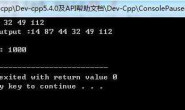#include <iostream> #include <map> using namespace std; class Polynomial { public: int& coefficient(unsigned degree) { return deg2coeff[degree]; } const int& coefficient(unsigned degree) const { return deg2coeff.at(degree); } size_t size() const { return deg2coeff.size(); } Polynomial operator+(const Polynomial &that) { Polynomial result; result.deg2coeff = (this->size() > that.size()) ? deg2coeff : that.deg2coeff; const auto &smaller = (this->size() <= that.size()) ? *this : that; for (const auto &it : smaller.deg2coeff) { result.coefficient(it.first) += smaller.coefficient(it.first); } return result; } friend std::ostream& operator<<(std::ostream& ostr, const Polynomial &poly); private: map<unsigned, int> deg2coeff; }; std::ostream& operator<<(std::ostream& ostr, const Polynomial &poly) { for (auto it = poly.deg2coeff.crbegin(); it != poly.deg2coeff.crend(); ++it) { if (it->second == -1) ostr << "-"; else if (it->first == 0 || it->second != 1) { if (it->second > 0) ostr << "+"; ostr << it->second; } if (it->first) { ostr << "x"; if (it->first != 1) ostr << "^" << it->first; } } return ostr << endl; } void read_polynomial(Polynomial &poly) { cout << "Number of degrees: "; unsigned n; cin >> n; int degree, coeff; for (unsigned i = 0; i < n; ++i) { cout << "Enter Degree, Coefficient: "; cin >> degree >> coeff; if (coeff) { poly.coefficient(degree) = coeff; } } } int main() { Polynomial p1; read_polynomial(p1); cout << p1; Polynomial p2; read_polynomial(p2); cout << p2; cout << (p1 + p2); }
解决方案
60
减法
#include <iostream> #include <map> using namespace std; class Polynomial { public: int& coefficient(unsigned degree) { return deg2coeff[degree]; } const int& coefficient(unsigned degree) const { return deg2coeff.at(degree); } size_t size() const { return deg2coeff.size(); } Polynomial operator+(const Polynomial &that) { Polynomial result; result.deg2coeff = (this->size() > that.size()) ? deg2coeff : that.deg2coeff; const auto &smaller = (this->size() <= that.size()) ? *this : that; for (const auto &it : smaller.deg2coeff) { result.coefficient(it.first) += smaller.coefficient(it.first); } return result; } Polynomial operator-(const Polynomial &that) { Polynomial result, result1; result.deg2coeff = deg2coeff; result1.deg2coeff = that.deg2coeff; for (const auto &it : result.deg2coeff) { result.coefficient(it.first) += -result1.coefficient(it.first); result1.coefficient(it.first) = 0; } for (const auto &it : result1.deg2coeff) { if(result1.coefficient(it.first)!= 0) result.coefficient(it.first) = -result1.coefficient(it.first); } return result; } friend std::ostream& operator<<(std::ostream& ostr, const Polynomial &poly); friend std::ostream& operator<(std::ostream& ostr, const Polynomial &poly); private: map<unsigned, int> deg2coeff; }; std::ostream& operator<(std::ostream& ostr, const Polynomial &poly) { for (auto it = poly.deg2coeff.crbegin(); it != poly.deg2coeff.crend(); ++it) { if (it->second <0) { ostr << it->second; } else if (it->first == 0 || it->second >=0) { ostr << "+"; ostr << it->second; } if (it->first) { ostr << "x"; if (it->first != 1) ostr << "^" << it->first; } } return ostr << endl; } std::ostream& operator<<(std::ostream& ostr, const Polynomial &poly) { for (auto it = poly.deg2coeff.crbegin(); it != poly.deg2coeff.crend(); ++it) { if (it->second == -1) ostr << "-"; else if (it->first == 0 || it->second != 1) { if (it->second > 0) ostr << "+"; ostr << it->second; } if (it->first) { ostr << "x"; if (it->first != 1) ostr << "^" << it->first; } } return ostr << endl; } void read_polynomial(Polynomial &poly) { cout << "Number of degrees: "; unsigned n; cin >> n; int degree, coeff; for (unsigned i = 0; i < n; ++i) { cout << "Enter Degree, Coefficient: "; cin >> degree >> coeff; if (coeff) { poly.coefficient(degree) = coeff; } } } int main() { Polynomial p1; read_polynomial(p1); cout << p1; Polynomial p2; read_polynomial(p2); cout << p2; cout < (p1 - p2); return 0; }




